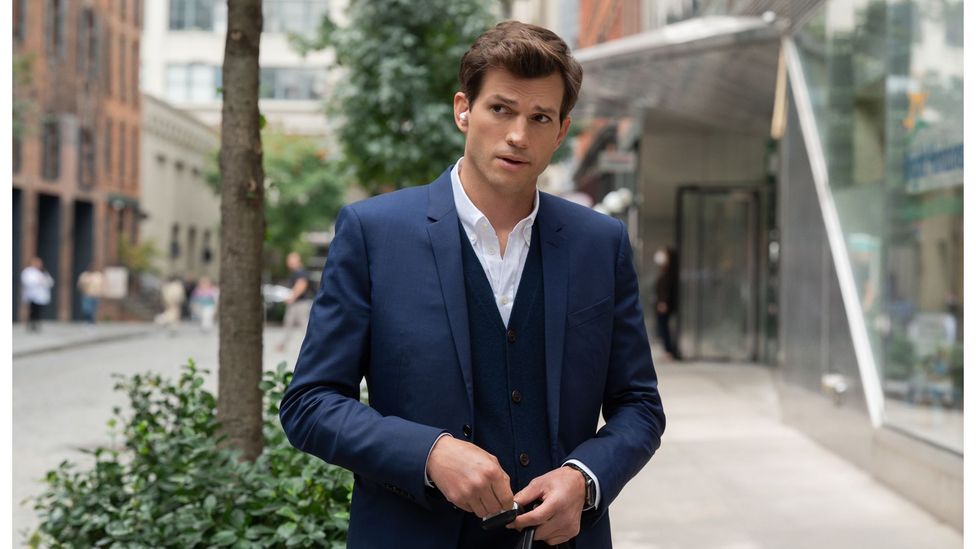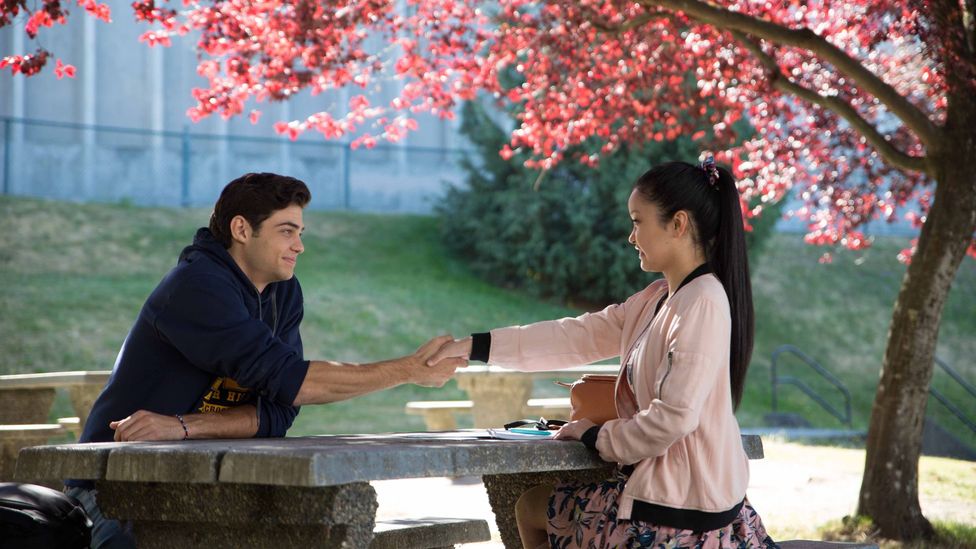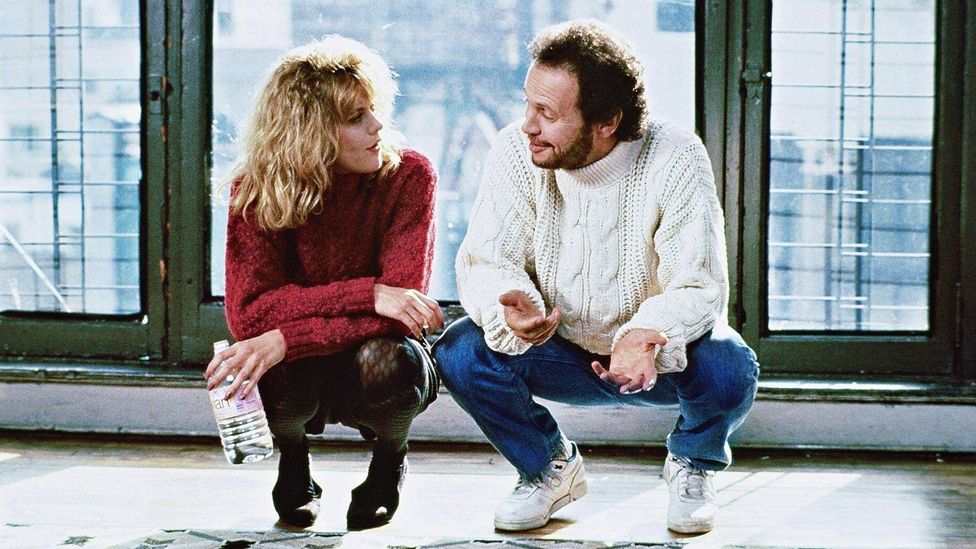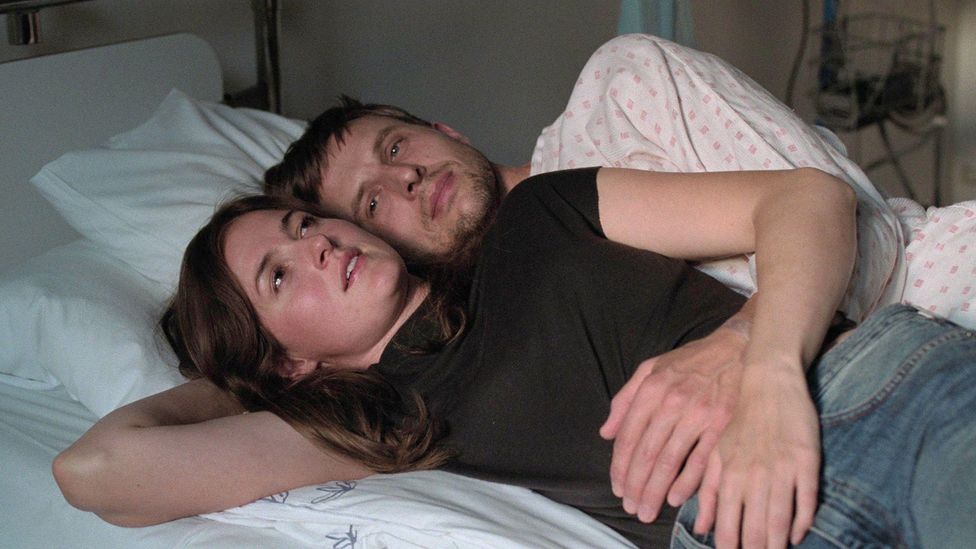Is the rom-com truly back?

“If you think about what society as a whole is currently obsessed with, it always leads back to nostalgia. We have not been able to shake it,” Bianca Betancourt, culture editor of Harper’s Bazaar US, tells BBC Culture. From TV reboots like HBO Max’s recently-cancelled Gossip Girl, to Ben Affleck and Jennifer Lopez’s 2022 nuptials, Ugg boots, velour tracksuits and low-rise jeans apparently coming back into fashion, Paris Hilton singing her 2006 hit Stars are Blind to ring in the New Year, and the public re-evaluation of how women like Britney Spears were once treated, popular culture is particularly fixated with the early 2000s right now.
More like this:
– The Last of Us is a ‘remarkable’ show
– The reinvention of the murder mystery
– The 90s cop show that changed TV
In film, this nostalgia is driving the resurgence of a genre that defined both the 90s and the noughties: the romantic comedy. On 15 January, Rom Com Archive, a Twitter account that is dedicated to iconic scenes from romantic comedies, posted a viral thread about 23 of the romantic comedies slated for release in 2023. From Shotgun Wedding (Jennifer Lopez, Josh Duhamel) to Maybe I Do (Emma Roberts, Richard Gere, Diane Keaton, Susan Sarandon) and Anne Hathaway’s long-awaited return to the genre in the adaptation The Idea of You, romantic comedies are enjoying a mainstream renaissance.

Your Place or Mine has been described by Rolling Stone as having a ‘strange charm’ (Credit: Netflix)
This Valentine’s Day follows the 10 January release of Your Place or Mine, a glossy rom-com starring Reese Witherspoon and Ashton Kutcher. The film follows two long-distance best friends who swap homes for a week and – you’ve guessed it – start developing romantic feelings for each other. It is written and directed by Aline Brosh McKenna (The Devil Wears Prada, 27 Dresses) and feels specifically designed to hark back to the genre’s previous era. Your Place of Mine is the latest in a series of rom-coms starring actors who had previously flown the nest to star in different types of films. Last year, rom-com titans Julia Roberts and George Clooney starred in Ticket to Paradise. It became the most successful rom-com of 2022, described as “a win not only for old-fashioned romantic comedies, but also movies targeted at older audiences.”
The rom-com resurgence has defied expectations. In 2014, BBC Culture asked whether the format was dying out altogether. “The good romantic comedy seems to be an endangered genre,” Angie Errigo, co-author of Chick Flicks: A Girl’s Guide to the Movies Women Love, said at the time. It certainly felt like there was a noticeable dip in the number of rom-coms being released – particularly ones that performed well commercially or garnered critical praise – until recently. Silver Linings Playbook – David O Russell’s film starring Jennifer Lawrence and Bradley Cooper – branded itself as a rom-com and was Oscar-nominated for best picture in 2012. But it was a far cry from the more mainstream and unashamedly clichéd rom-coms of yore, which now have a space in mainstream culture once again.
The rom-com recession
Scott Meslow, author of From Hollywood with Love: The Rise and Fall (and Rise Again) of the Romantic Comedy, thinks the death of the romantic comedy was over-hyped. Rather than a rejection of the genre, specifically, he says it was more closely linked to wider industry factors. “It was more the decline of the mid-budget Hollywood film than rom-coms in particular,” he tells BBC Culture. “At that time, there was a sense that everything was either a $10 million dour indie film that might win best picture, or a $300 million Avengers movie blockbuster.” As for why the rom-com seemed to suffer more than other genres, Meslow thinks there was misogyny at play. “Rom-coms are a genre that tends to star women, and tends to be disproportionately written and directed by women,” he says. “Those were films that, during this time, it was easy for studios to either not make at all, or under-promote and under-produce.”
The rom-com’s alleged extinction might have been oversold, but the genre did experience a slump from which it now seems to be recovering. Meslow puts this down to the rise of streaming. “Everything that makes a rom-com look unattractive to a traditional Hollywood studio now makes them more attractive to a service like Netflix,” he says. “You can attract stars, but you can do it on a relatively small budget with relatively few locations, and you can shoot pretty fast.” The downside of this, he says, is that audiences have now been “trained” to think that major film events like Avatar: The Way of Water – which can be watched in 4-D – or spoiler-packed Marvel films, are the films most worth taking the time to see at the cinema. “I wish rom-coms would attract that kind of audience too,” he says.

Based on Jenny Han’s YA novel, To All the Boys I’ve Loved Before spawned a franchise, with two sequels and a spin-off TV series (Credit: Netflix)
Betancourt agrees that streaming has been a key driver of the rom-com resurgence. “How we watch movies now changes what we expect from them,” she says. “If we waste 90 minutes watching something on Netflix that wasn’t perfect, we’re not going to be as upset as if we spent money going to see it and hired a babysitter for the evening.” She and Meslow both highlight To All the Boys I’ve Loved Before – Neftlix’s 2018 adaptation of Jenny Han’s best-selling novel of the same name – as a key moment that re-energised the rom-com genre. The film was a critical and commercial success, spawning two sequels and cementing its leads, Lana Condor and Noah Centineo, as teen idols. Although the film was criticised by some fans for not including an Asian male love interest, that in itself exemplified how much audience expectations of rom-coms – and mainstream films in general – have changed since the 1990s. Released the same month as Crazy Rich Asians – a rom-com about a professor who travels to meet her boyfriend’s family, and is surprised to discover they are among the richest in Singapore – To All the Boys I’ve Loved Before was described as a similarly important moment for Asian-American representation in mainstream culture.
Changing with the times
When considering the rom-com genre, it’s impossible to ignore the fact that this type of film often ages badly. Growing up, Bridget Jones’s Diary was a favourite in Betancourt’s household. But now, watching the movie back, she says she can’t believe how many jokes there were about Renee Zellweger’s weight, or some of the problematic power dynamics that the film romanticised. Partly, this is because rom-coms tend to reflect the mainstream gender norms of the time, which can quickly become outdated, like the many storylines in Richard Curtis’s Love Actually that have aged poorly. Through today’s lens, the central plot of My Best Friend’s Wedding – a fairly inoffensive film where the two protagonists had a pact to marry one another if they weren’t engaged by the not-so-ripe age of 28-years-old – now seem almost mediaeval. Betancourt thinks this is down to social norms changing over time, but also social media becoming a central part of how films are consumed and discussed. “Twenty or 30 years ago, we were able to watch movies without suddenly having to think so hard about the consequences of them,” she says.
The enduring love for the classics of the genre from the 1990s and 2000s is fuelled by nostalgia for this time. “Our expectations of romance have changed drastically in the past three decades. But when we watch an older rom-com, we specifically watch it for that nostalgia,” Betancourt says. “Whether it’s for the romance, the fashion or a fondness for the era it took place in.” This prompts a bigger question: are some of the problematic or outdated parts of rom-coms actually part of what we like about them?

The 1989 US film When Harry Met Sally is widely regarded as one of the best rom-coms ever made (Credit: Alamy)
Annie Lord, dating columnist at British Vogue and author of break-up memoir Notes On Heartbreak, thinks this might be the case. “I just really want someone to run to me and tell me everything they love about me, to lay it all out there like Harry did,” she says, recalling her love for When Harry Met Sally. “I used to fantasise about that all the time, to the point where I would be disappointed if it never happened to me.” To Lord, some of the moments that stick out most from her favourite rom-coms seem outdated today, like a man defending a woman’s honour, and whisking her off her feet. “I know in my head that, as a woman, I can do that for myself. But watching those older rom-coms there’s a fantasy in not having to be self-sufficient, even though I know I can be,” she says. “They take us back to a simpler time. Everything is just so stressful right now. The planet is burning, the economy is terrible, so there’s an escapism there.” Now that we’re able to better identify outdated storylines and norms in rom-coms, there is a knowing irony which allows us to still enjoy them, with a pinch of salt.
This ironic nostalgia is also driving the wave of new rom-coms, many of which are trying to recreate the magic of old-school classics by openly borrowing their language and clichés. Now, audiences are much wiser to the narrative structure of rom-coms and aren’t always watching them for a realistic portrayal of romance, or exemplary gender politics. “We’re in an era now where people are more unapologetic about enjoying the genre and fans are familiar with most of its tropes,” Meslow says. “They know what they’re signing up for – and they enjoy it.” Some rom-coms are becoming more self-analytical and self-aware too. Billy Eichner’s 2022 rom-com Bros made constant references to rom-com tropes, Hallmark movies and the film’s own place within that canon. And we can see this as far back as 2011’s Friends with Benefits, starring Mila Kunis and Ashton Kutcher, where a running joke between the characters was the pair trying to avoid becoming a rom-com cliché, before succumbing to the inevitable.
The future of rom-coms
It feels like the audience for rom-coms has now expanded. “For a long time, people thought rom-coms were for women and gay men,” Betancourt says. “I definitely think that the audience has evolved and now includes more people.” This is partly down to streaming making it easier and cheaper to watch a wider variety of films. But even in the so-called rom-com slump, there were films that challenged the genre’s traditional formula. Bridesmaids (2011) was a film that featured a romantic plotline, but primarily revolved around friendship. Bad Teacher (2011) followed a purposefully villainous protagonist who openly scammed school children, but who we ended up rooting for. It’s Complicated (2010) followed an older couple who rekindled their relationship. And from Wedding Crashers (2005) to Knocked Up (2007) and Along Came Polly (2004), there are no shortage of old-school rom-coms that explored romance through a heterosexual male lens.
Now, though, we’re seeing a much greater diversity of characters and viewpoints. “You can’t write a history of the genre without acknowledging that it has been disproportionately white, rich, thin and straight,” Meslow says. “It’s also skewed towards fairly conservative relationship norms, but that is where streaming platforms can also take some credit now, because they tend to take more chances.” The new wave of rom-coms have the opportunity to expand the plotlines we’re accustomed to seeing in glossy mainstream films. In fact, one of the main criticisms of Eichner’s gay rom-com Bros – which, perhaps not unrelatedly, was initially released in theatres rather than streaming – was that it didn’t experiment enough. “Rather than reinvent the genre around a different set of mores, it simply replaces the ‘marriage plot’ with the ‘monogamy plot’, down to our former free-agent hero being harangued by his new beau about kids,” wrote Matt Brennan in the LA Times.

The 2021 Norwegian rom-com The Worst Person in the World won awards and was described by The Guardian as ‘an instant classic’ (Credit: Alamy)
Looking ahead, it’s difficult to say where the genre will go next because it is so varied. There are Hallmark-style movies that Netflix puts out every Christmas (The Knight Before Christmas) and nostalgia-fuelled mainstream rom-coms (Your Place or Mine), which are trying to recreate the magic of old-school favourites like The Holiday. There are rom-coms aimed at the teen audience (To All the Boys I’ve Loved Before), and also a sub-genre that is considered more “high-brow” and attracts critical acclaim, like Oscar-nominated Norwegian film The Worst Person in the World. “It’s a hugely diverse and interesting time for rom-coms in terms of the subject, tone, format and the people making them,” explains Meslow.
In terms of characters, two trends seem set to continue. First, actors who we have seen in rom-coms previously will return to the genre in films like Ticket to Paradise, which are aimed at an older audience. Secondly, the people making rom-coms and the stories they explore on-screen will become more diverse. Looking ahead to this year, What’s Love Got to Do With it, starring Shazad Latif and Lily James, explores romantic tension between a documentary maker and a childhood friend who has recently announced his arranged marriage. Rye Lane (Searchlight) and The Perfect Find (Netflix) both follow romance between black lead characters. Red, White & Royal Blue (Prime), an adaptation of the bestselling book by Casey McQuiston, follows the First Son of the United States and his romantic relationship with a British prince. “I know fans would eat up an Issa Rae rom-com, whether she was writing or starring in it, or a Quinta Brunson rom-com,” predicts Betancourt. “There are so many people who could make them.”
A key challenge facing the new wave of rom-coms will be reflecting how people are finding love, or the different types of relationships we’re having. Dating has changed a lot since You’ve Got Mail’s foray into flirting via anonymous email. “Rom-coms still haven’t quite squared how people are dating now,” says Meslow. “I wonder which rom-com will really get Tinder right? Or open relationships?” When it comes to Tinder, Lord isn’t convinced a film like that is forthcoming. “So many rom-coms are about an escapist fantasy, but dating apps are so unromantic and boring,” she says. “I wonder how you’d make something so mundane and horrible into a punchy and romantic film.” Still, she is hopeful for more films that explore different relationship structures, stories that are more “messy” and concepts like “self-love”, reflecting the language people now use to describe their relationships.
After an initial slump in the 2010s, it seems like a mixture of cultural nostalgia and changing viewing habits have revived the rom-com. For now, the future of the genre seems bright and, crucially, filled with more variety than we’ve seen in previous decades. “The rom-com structure has been around since the days of Shakespeare. And it turns out you can still breathe a lot of life into these tropes by tweaking them a little bit,” Meslow says. “It feels like the enthusiasm is back.”
Your Place or Mine is on general release now.
Love film and TV? Join BBC Culture Film and TV Club on Facebook, a community for cinephiles all over the world.
If you would like to comment on this story or anything else you have seen on BBC Culture, head over to our Facebook page or message us on Twitter.
And if you liked this story, sign up for the weekly bbc.com features newsletter, called The Essential List. A handpicked selection of stories from BBC Future, Culture, Worklife and Travel, delivered to your inbox every Friday.








